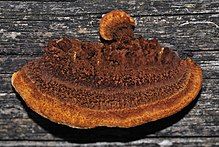Gloeophyllum sepiarium
| Gloeophyllum sepiarium | |
|---|---|

| |
| Scientific classification | |
| Domain: | Eukaryota |
| Kingdom: | Fungi |
| Division: | Basidiomycota |
| Class: | Agaricomycetes |
| Order: | Gloeophyllales |
| Family: | Gloeophyllaceae |
| Genus: | Gloeophyllum |
| Species: | G. sepiarium
|
| Binomial name | |
| Gloeophyllum sepiarium (Wulfen) P. Karst., (1879)
| |
| Synonyms | |
|
Agaricus asserculorum Batsch, (1783) | |
Gloeophyllum sepiarium, the rusty gilled polypore, is a wood decay fungus that causes a brown rot.
Description
[edit]The cap is 1.5–15 centimetres (1⁄2–6 in) wide, loosely fan-shaped, brown with a yellow-orange margin during growth, velvety then smooth, and leathery with a mild odor and taste.[1] The gills are adnate and close, light when fresh and darker both near the wood and in age.[2] The spores are white, cylindrical, and smooth.[1] The spore print is white.[2]
The fruiting body grows for only one year, and produces spores in late summer and autumn. Its hymenial surface is distinctive from other polypores due to the presence of gills.
The species is inedible.[3]
Similar species
[edit]Similar species include G. trabeum, Daedaleopsis confragosa,[2] Daedalea quercina, Lenzites betulina,[1] Trametes betulina,[2] and T. versicolor.[1]
Habitat and distribution
[edit]It grows on dead conifers, both in the wild and on lumber.[2]
It is found throughout North America.[2]
References
[edit]- ^ a b c d Davis, R. Michael; Sommer, Robert; Menge, John A. (2012). Field Guide to Mushrooms of Western North America. Berkeley: University of California Press. p. 344. ISBN 978-0-520-95360-4. OCLC 797915861.
- ^ a b c d e f Audubon (2023). Mushrooms of North America. Knopf. p. 205. ISBN 978-0-593-31998-7.
- ^ Phillips, Roger (2010). Mushrooms and Other Fungi of North America. Buffalo, NY: Firefly Books. p. 312. ISBN 978-1-55407-651-2.
External links
[edit]| Gloeophyllum sepiarium | |
|---|---|
| Gills on hymenium | |
| No distinct cap | |
| Hymenium attachment is irregular or not applicable | |
| Lacks a stipe | |
| Spore print is white | |
| Ecology is saprotrophic | |
| Edibility is inedible | |
![]() Media related to Gloeophyllum sepiarium at Wikimedia Commons
Media related to Gloeophyllum sepiarium at Wikimedia Commons
